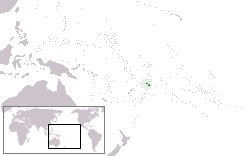Upolu
 Map of Samoa showing Upolu at right | |
 | |
| Geography | |
|---|---|
| Location | Pacific Ocean |
| Coordinates | 13°55′S 171°45′W / 13.917°S 171.750°W |
| Area | 1,125 km2 (434 sq mi) |
| Length | 75 km (46.6 mi) |
| Highest elevation | 1,113 m (3652 ft) |
| Highest point | Mount Vaivai[1] |
| Administration | |
Samoa | |
| Largest settlement | Apia (pop. ~35,000) |
| Demographics | |
| Population | 143,418 (2011) |
| Pop. density | 127/km2 (329/sq mi) |
| Ethnic groups | 92.6% Samoans, 7% Euronesians (persons of European and Polynesian blood), 0.4% Europeans |
Upolu is an island in Samoa, formed by a massive basaltic shield volcano which rises from the seafloor of the western Pacific Ocean. The island is 75 kilometres (47 miles) long and 1,125 square kilometres (434 square miles) in area, making it the second largest of the Samoan Islands by area. With approximately 145,000 inhabitants, it is by far the most populous of the Samoan Islands. Upolu is situated to the southeast of Savai'i, the "big island". Apia, the capital, is in the middle of the north coast, and Faleolo International Airport is at the western end of the island. The island has not had any historically recorded eruptions, although there is evidence of three lava flows, dating back only to between a few hundred and a few thousand years ago.
In the Samoan branch of Polynesian mythology, Upolu was the first woman on the island.
James Michener based his character Bloody Mary in Tales of the South Pacific (later a major character in the Rodgers and Hammerstein musical, South Pacific) on the owner of Aggie Grey's Hotel on the south end of the island. She was still running the hotel in 1960. A branch was later opened in Apia overlooking the harbor.
History
In 1841, the island was the site of the Bombardment of Upolu, an incident during the United States Exploring Expedition.
In the late 19th century, the Scottish writer Robert Louis Stevenson owned a 400-acre (160-hectare) estate in the village of Vailima in Upolu. He died there in 1894 and is buried at the top of Mount Vaea overlooking his former estate. The Vailima estate was purchased in 1900 to serve as the official residence for the German governor of German Samoa. When the British/Dominion took over governance of the islands, they confiscated the estate and put it to the same use. It later served as the residence for the New Zealand administrator and, after independence, for the Samoan head of state. During World War II the US Navy built Naval Base Upolu on the island.[2] [3]
2009 Samoa tsunami
The island of Upolu was hit by a tsunami at 06:48:11 local time on 29 September 2009 (17:48:11 UTC).[4] Twenty villages on Upolu's south side were reportedly destroyed, including Lepā, the home of Samoa's Prime Minister,[5] Tuila'epa Sa'ilele Malielegaoi. In Lepā, only the church and the village's welcome sign remained standing after the disaster.[6][7]
Wildlife
An extremely small species of spider lives on Upolu. According to the Guinness Book of World Records, the spider is the size of a period on a printed page.[8]
Depictions in popular culture
Upolu was the filming location for the 1953 South Seas film Return to Paradise, starring Gary Cooper.
The island was also the filming location for several seasons of several editions of the competition reality television series, Survivor. This included:
- Four seasons of the American version of Survivor, Survivor: Samoa (19th season); Survivor: Heroes vs. Villains (20th season); Survivor: South Pacific (23rd season); and Survivor: One World (24th season).
- Three seasons of Australian Survivor: the 3rd season in 2016 and the 4th season in 2017, and the Australian Survivor: Heroes vs Villains in 2023 (10th season) and;
- One season of Survivor South Africa: Survivor South Africa: Island of Secrets (7th season) in 2019.
Gallery
-
Damage from Cyclone Evan in 2012
-
USNS Richard E. Byrd docked at Upolu
-
The south-eastern coast of Upolu, Nu'utele island can be seen in the far distance.
See also
Notes
- ^ Fuimaono Lumepa Hald (13 May 2022). "Mt. Fito not the highest point in Upolu". Samoa Observer. Retrieved 14 May 2022.
- ^ Built of US Navy basesUS Navy
- ^ "Straw | Operations & Codenames of WWII". codenames.info.
- ^ Magnitude 8.0 – Samoa Islands Region Archived 7 October 2009 at the Wayback Machine Report on U.S. Geological Service's website. Retrieved online d.d. 29 September 2009.
- ^ Baris Atayman (29 September 2009). "Tsunami smashes Pacific islands, over 100 feared dead". windsorstar.com. Archived from the original on 6 October 2011. Retrieved 30 September 2009.
- ^ McClean, Tamara (2 October 2009). "Searching ruins for reason to live after the tsunami". The Daily Telegraph. Sydney. Retrieved 5 October 2009.
- ^ "At least seven dead after quake, tsunami hit Samoa". The New Zealand Herald. 30 September 2009. Retrieved 19 August 2010.
- ^ "Smallest spider". Guinness World Records. Retrieved 6 July 2017.
References
- "Upolu". Global Volcanism Program. Smithsonian Institution. Retrieved 18 December 2008.
External links
 Media related to Upolu at Wikimedia Commons
Media related to Upolu at Wikimedia Commons Upolu travel guide from Wikivoyage
Upolu travel guide from Wikivoyage- Samoa Tourism Authority




